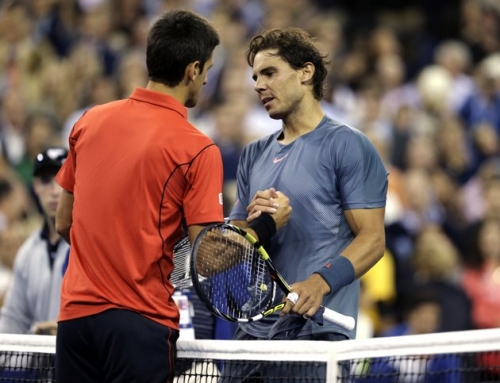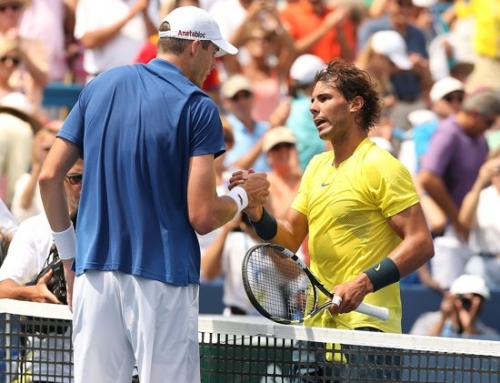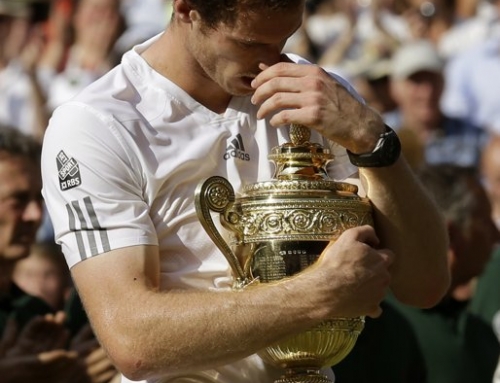 Singles tennis is a solitary sport.
Singles tennis is a solitary sport.
You play by yourself. Even if you are the product of a team.
Many players that get to the very top are stubborn. People have suggested that Roger Federer play with a bigger racquet. Or that he play more patient tennis. Instead, he mostly plays like he has always played. And why not? It’s worked so far. Boris Becker was notoriously stubborn. He was most effective coming to net, but would often want to beat a player from the baseline just to show he could do it. Steffi Graf could never feel comfortable with the topspin backhand. She beat a large number of players love and love. Could she not have hit topspin for one set, and even if it were, say, 6-3, just live with that. Martina, who hit exclusively slice in her early career, learned to hit topspin and used it frequently. (I noticed that all the examples of stubborness come from German players–Federer is close enough since one of the three languages spoken in Switzerland is German).
This isn’t to say players don’t change. Andy Roddick’s forehand is different now than it was when he first came on tour. Same with Mardy Fish. Players to adjust their hitting style or their temperament. But frequently, these players know what they’re comfortable with and don’t like too much change. Sometimes, as with James Blake, they are tenacious in what they feel is right, unwilling to make changes that might upset their comfort with the game. And mostly, when these players become champs, they get an ego.
Roger Federer may be well-respected, an easy-going guy that people like to like. But he’s nothing if not self-confident. He can lose a few times to a player and still be convinced that he’s the better player. Perhaps these are the kinds of mind games the elite must play to keep themselves in a positive frame of mind.
Rafael Nadal somehow upsets this mold. Nadal has been coached by his uncle for a long time, pretty much since he was a kid. Uncle Toni provides a firm hand. He wants it known that he’s in charge. Rafa must stay humble. He must do the menial stuff. He must show respect to his elders. Roger Federer travels around in private jets because it lets him get to his next event in style without unnecessary hassle. Pete Sampras did the same. When you are among the top players in the world, you have the kind of money to spend to make this happen. It’s a far cry from the amateur days where you might take a bus or a van to your next tournament.
Not Rafa. Rafa has been known to take commercial flights. He takes a bus from the US Open back to his hotel. He carries his own luggage. All of this is to reinforce a strong sense of humility that Rafa is not better than anyone else.
That humility might hurt Rafa were he not so ferociously good on court. Imagine if Rafa was known as a guy that choked on the biggest stages. Critics might blame this humility for his losses. They would tell Rafa that he needs to be meaner. He needs to believe he can beat these guys. But, he maintains this humility even as he is among the best fighters in the game.
Rafa exhibits a Jekyll-Hyde dual personality. Sometimes you see it out on court. Rafa used to get a bit scared on court. When that happened, he resorted to his comfort zone. High topspin shots hit up the middle, chase everything down, and hit big shots if the opponents came to net. You see less of this Rafa now. He goes for bigger shots. He pressures his opponents. Of course, they often do the nice thing and miss.
This humility means that Rafa is willing to change his game as required by Toni. When Rafa was young, he had to learn to hit low shots and hit them for winners. This may be one reason Rafa is so good on grass. Toni had Rafa play on bad courts to get used to bad bounces. He wanted to create adverse conditions and get Rafa accustomed to all of it.
This doesn’t mean Rafa is a pushover. You saw the edges of his anger during the rain delays at the US Open. Scheduled, on short notice, to play his match against Gilles Muller, Rafa was late by ten minutes. He has a routine that he likes to go through, including getting taped up just before the match. This routine keeps him calm. When weather forces him to rush, he gets upset. And he had to be even more upset when he realized the court was wet.
One wonders, however, if Rafa could ever be coached by anyone besides his Uncle. Uncle Toni has Rafa’s respect, possibly even fear. Toni once said that he didn’t let Rafa pay him (Toni probably gets money by endorsements, namely, the ever-present Iberostar hat) because if he got paid by Rafa, then Rafa was in control. He didn’t want that. Most other coaches have to work that balance out with their players. The players pay them, so they, as coaches, can only push a player so much, even if the coach thinks it’s what’s needed.
For example, despite all the success Brad Gilbert had as Andre Agassi’s coach, his next two most prominent clients, Andy Roddick and Andy Murray, both split with Gilbert within less than two years. Gilbert, it turns out, is one chatty guy. He wants to be with the player all the time, talking all the time. Neither Roddick nor Murray wanted that. Murray, in particular, said he didn’t want to yell with his coach when they had a difference in philosophy.
From what I can tell, Nadal lets Uncle Toni figure out what changes were needed in Rafa’s game. Since Rafa came on tour, he’s learned to play in closer to the baseline (at least on hardcourts), he’s beefed up his serve and his volley. He hits a great overhead. He’s added a slice backhand. For a while, he had a better serve. Toni does seem to be on far more technically sound ground than, say, Marion Bartoli’s father, who also has a daughter that seems to listen to what he has to say even if the results appear a bit like Frankenstein.
Rafa recently had an autobiography published. Apparently, in this book, he confesses that he has insecurities, as most would, and occasionally, you see him fighting these demons, although these days, it’s mostly encompassed in Novak Djokovic.
There may never be another champion that was created like Rafa, in his odd mix of humbleness and fight. It’s been said that boxers are ironic. They are among the most ferocious of athletes, yet, they are often in fear their livelihood may be taken away from them especially since they have spent all their lives worrying about boxing and not necessarily living. Rafa isn’t quite at that extreme, but certainly, the combination of quiet and fight is unlike any other.




![[US Open Men’s Final] Can Djokovic beat Nadal in the finals?](https://www.essentialtennis.com/wp-content/uploads/2013/09/20130909djokovic-500x383.jpg)


![[French Open] The tactics of the Djokovic-Nadal semifinals](https://www.essentialtennis.com/wp-content/uploads/2013/06/20130607nole-500x383.jpg)